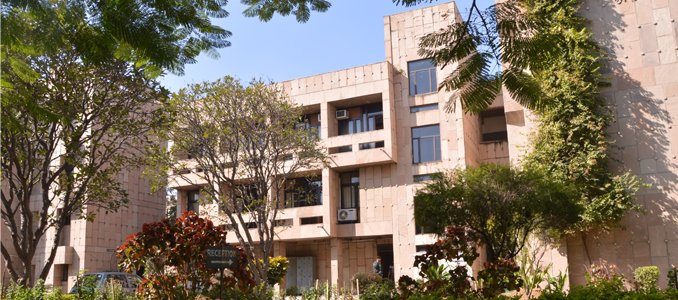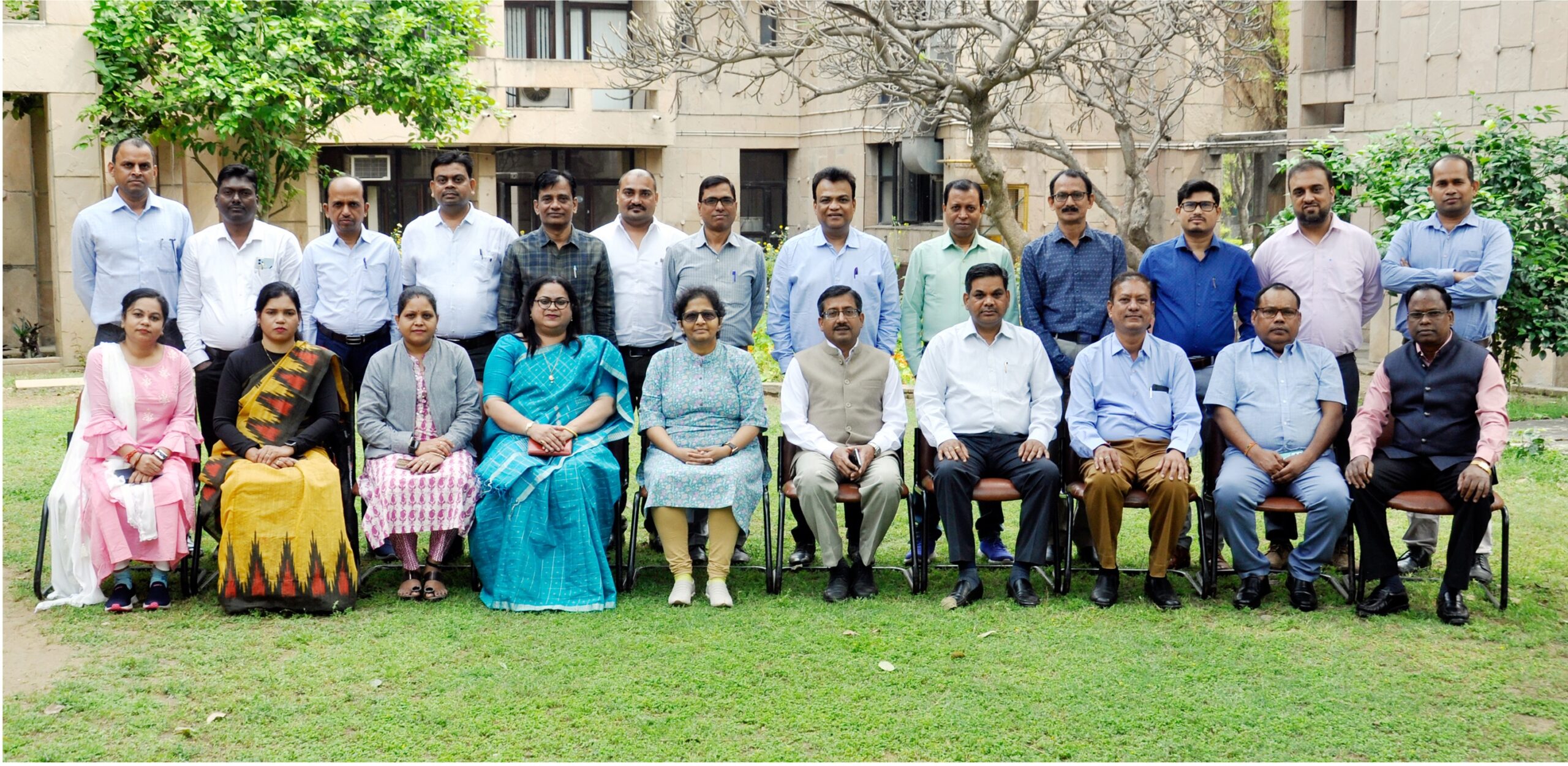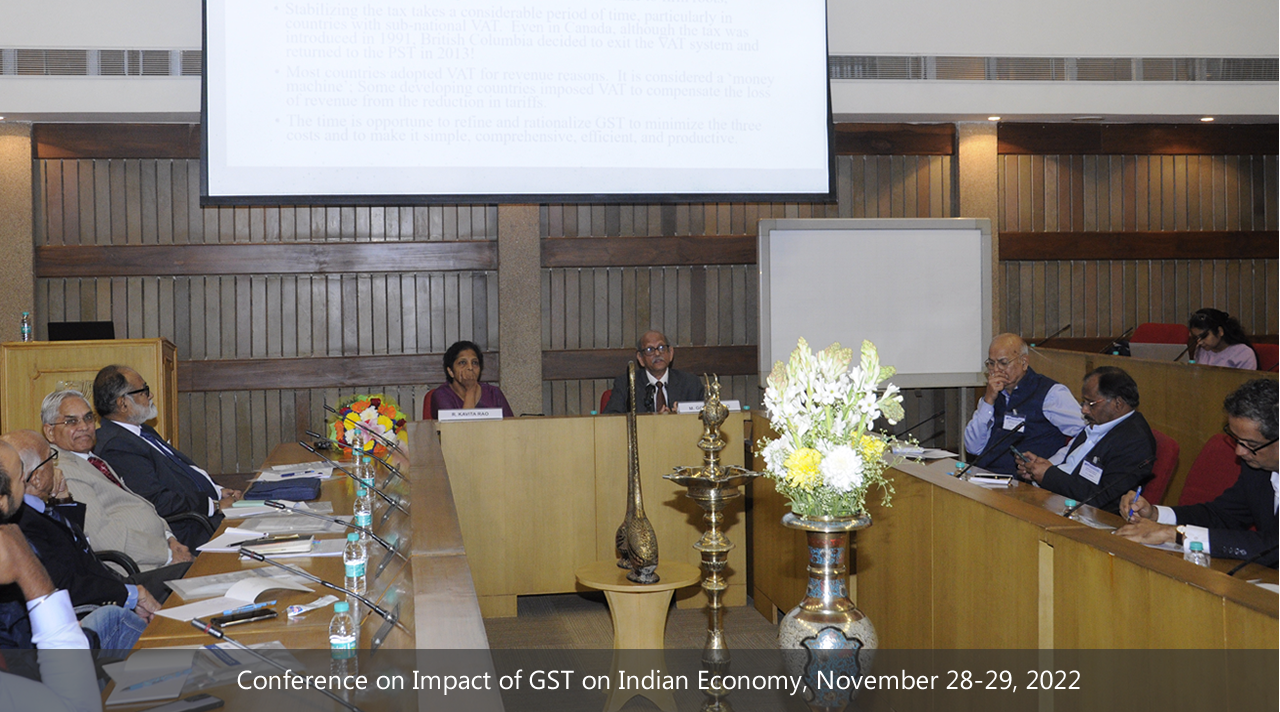The National Institute of Public Finance and Policy (NIPFP) is a centre for research in public economics and policies. Founded in 1976, the institute undertakes research, policy advocacy and capacity building in areas related to public economics. One of the major mandates of the institute is to assist the Central, State and Local governments in formulating and reforming public policies by providing an analytical base.

Welcome to National Institute
of Public Finance and Policy
The National Institute of Public Finance and Policy (NIPFP), founded in 1976, is a leading research center in public economics and policy.

राष्ट्रीय संस्थान
सार्वजनिक वित्त एवं नीति नई दिल्ली
प्रशिक्षण कार्यक्रम पर
राज्य स्तर पर सार्वजनिक वित्त एवं प्रबंधन को सुदृढ़ बनाना

Interaction with the Peer Review Committee: NIPFP faculty interacting with the members of the Committee (Friday, 19th May 2023)

Interaction with the Peer Review Committee: NIPFP faculty interacting with the members of the Committee (Friday, 19th May 2023)

Conference on Impact of GST on Indian Economy, November 28-29, 2022
National Institute of Public Finance and Policy
Know About NIPFP
The National Institute of Public Finance and Policy (NIPFP) is a centre for research in public economics and policies. Founded in 1976, the institute undertakes research, policy advocacy and capacity building in areas related to public economics. One of the major mandates of the institute is to assist the Central, State and Local governments in formulating and reforming public policies by providing an analytical base. The institute was set up as an autonomous society, at the joint initiative of the Ministry of Finance, Planning Commission, several State governments and distinguished academicians. It is registered under the Societies Registration Act, 1860.
In its 47 years of existence, the institute has emerged as a premier think tank in India, and has made significant contribution to policy reforms at all levels of the government. It has maintained close functional links with the Central and State governments all along, and has built up linkages with other teaching and research institutions both in India and abroad. Although the institute receives an annual grant from the Ministry of Finance, Government of India, and various State governments, it maintains an independent non-government character in its pursuit of research and policy.
National Institute of Public Finance and Policy
Our Work NIPFP
The National Institute of Public Finance and Policy (NIPFP) is a renowned research institution specializing in public economics and policy analysis. Established in 1976, NIPFP conducts research, advocates for effective policies, and enhances government capacities. It collaborates with governments and academia to foster evidence-based policy development, maintaining its independence despite receiving government grants.

Research
NIPFP is a premier research institution in public economics and policies. The institute has made significant research contribution in the area of revenue and taxation, fiscal management, public expenditure, macro-economic policies, fiscal federalism and other public finance and policy issues both at the Central and the State-level -- Read More

Training
NIPFP undertakes training programmes on various aspects of public policy in general, and on themes in the area of public economics in particular. The beneficiaries of these training programmes include government officials, university and college teachers from India and other South Asian countries, researchers and journalists -- Read More

Policy support
NIPFP extends its support to public policy formulation not only through research, but also through representation of NIPFP faculty in various committees and commissions of the Central and State governments. It has made significant contribution to policy recommendations of Indirect Taxation Enquiry Commission, Economic -- Read More

Data Bank
This database contains budgetary data of the Union Government and States beginning 1987-88 in major detail (sourced from Finance Accounts of Union Government and respective States). This data base is regularly updated. Apart from Finance Accounts, we also have data on Union and State finances from respective budgets. -- Read More
Working papers
How is India Doing? Mid Year Macroeconomic Review, NIPFP WP No. 400, September, 2023. Author: Rudrani Bhattacharya, Manish Gupta, Dinesh Kumar Nayak, Radhika Pandey In Association With Sudipto Mundle

National Institute of Public Finance and Policy
Our NIPFP Projects
The National Institute of Public Finance and Policy (NIPFP) is a renowned research center specializing in public economics and policies. Explore our impactful NIPFP projects that shape innovative solutions for pressing economic and policy challenges.
Ongoing Projects
Past Projects
-
Public Spending, Governance, and Regional Disparity in Sustainable Development: A District-Level Analysis in Assam
Start date : March, 2022
Completion date : Feb, 2024
Sponsor : Indian Council of Social Science Research
Project leader : Bhabesh HazarikaEvaluation Report of Compliance
to Provisions of Sikkim FRBM Act for the
fiscal year 2020-21Start date : Jan, 2022
Completion date : May, 2023
Sponsor : Government of Sikkim
Project leader : Pratap Ranjan JenaChild Protection Public Expenditure
Review – OdishaStart date: Feb, 2022
Completion date : March, 2023
Sponsor UNICEF
Project leader: Lekha Chakraborty and AmandeepPublic Spending, Governance, and Regional Disparity in Sustainable Development: A District-Level Analysis in Assam
Start date : March, 2022
Completion date : Feb, 2024
Sponsor : Indian Council of Social Science Research
Project leader : Bhabesh HazarikaEvaluation Report of Compliance
to Provisions of Sikkim FRBM Act for the
fiscal year 2020-21Start date : Jan, 2022
Completion date : May, 2023
Sponsor : Government of Sikkim
Project leader : Pratap Ranjan JenaChild Protection Public Expenditure
Review – OdishaStart date: Feb, 2022
Completion date : March, 2023
Sponsor UNICEF
Project leader: Lekha Chakraborty and Amandeep -
Public Spending, Governance, and Regional Disparity in Sustainable Development: A District-Level Analysis in Assam
Start date : March, 2022
Completion date : Feb, 2024
Sponsor : Indian Council of Social Science Research
Project leader : Bhabesh HazarikaEvaluation Report of Compliance
to Provisions of Sikkim FRBM Act for the
fiscal year 2020-21Start date : Jan, 2022
Completion date : May, 2023
Sponsor : Government of Sikkim
Project leader : Pratap Ranjan JenaChild Protection Public Expenditure
Review – OdishaStart date: Feb, 2022
Completion date : March, 2023
Sponsor UNICEF
Project leader: Lekha Chakraborty and AmandeepPublic Spending, Governance, and Regional Disparity in Sustainable Development: A District-Level Analysis in Assam
Start date : March, 2022
Completion date : Feb, 2024
Sponsor : Indian Council of Social Science Research
Project leader : Bhabesh HazarikaEvaluation Report of Compliance
to Provisions of Sikkim FRBM Act for the
fiscal year 2020-21Start date : Jan, 2022
Completion date : May, 2023
Sponsor : Government of Sikkim
Project leader : Pratap Ranjan JenaChild Protection Public Expenditure
Review – OdishaStart date: Feb, 2022
Completion date : March, 2023
Sponsor UNICEF
Project leader: Lekha Chakraborty and Amandeep
National Institute of Public Finance and Policy
Meet Our Faculty Members !
Meet our distinguished faculty at the National Institute of Public Finance and Policy, experts in economics, policy analysis, and public finance. Discover their vast knowledge and commitment to shaping a better future.

R. Kavita Rao
Director
Email: director@nipfp.org.in
Phone: Phone 26569303, 26963421, Fax: 91-11-26512703, Extn.110

N. R. Bhanumurthy
Professor
Email: nr.bhanumurthy@nipfp.org.in
Secondary emails: nrbmurthy@gmail.com
Phone: 26569303 Ext – 114

Lekha Chakraborty
Professor
Email: lekha.chakraborty@nipfp.org.in
Other emails: lekhachakraborty@gmail.com
Phone: 9650012227 & 011-26569303
National Institute of Public Finance and Policy
(NIPFP) Infrastructure
The National Institute of Public Finance and Policy’s 3-acre campus near JNU and IIT houses a vast, centrally air-conditioned library specializing in public economics. It offers top-notch seminar and conference facilities, including a modern auditorium and multiple conference rooms with advanced equipment.

Campus
Spread over an area of 3 acres, the Institute is situated in quiet and pleasant environs near Jawaharlal Nehru University and the Indian Institute of Technology. The campus constitutes of two academic and an office block, residential quarters, a hostel (guest house) with greens on all sides

Library
The three-storied refurbished library houses one of the largest collections of Public Economics books and reports among all research institutes in the country. It is popular among researchers in the field of public finance owing to its extensive collection of central and state budget documents. The library is centrally air-conditioned with cubicles providing private workspace to the visitors. It has Wi-Fi facilities and automated through Libsys and Winisis

Seminar & conference facilities
The institute has excellent facilities for holding seminars and conferences. It has a state-of-the-art auditorium and three conference rooms of different sizes. These are equipped with overhead projectors, printable writing boards, public address systems, cable/satellite TV connections and video conferencing facilities. Additionally, there are separate committee rooms, meeting rooms and board rooms for smaller discussion groups.
